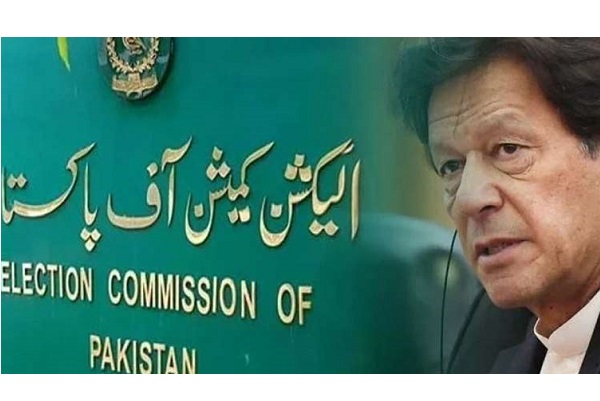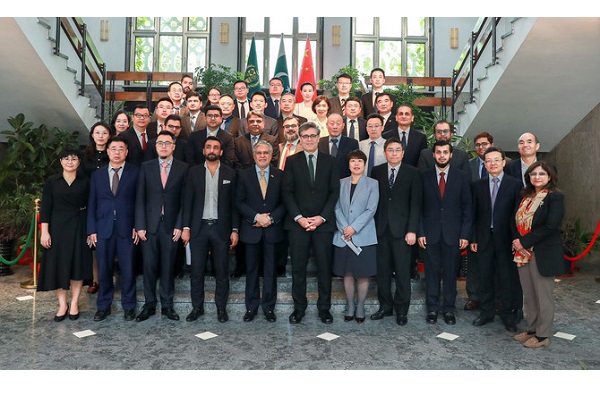ISLAMABAD: In National Assembly on Thursday Gul Asghar Khan of the Istehkam-i-Pakistan Party (IPP) said in his speech all major
ISLAMABAD: The Election Commission of Pakistan (ECP) on Monday set into motion the process to remove Imran Khan as chairman of the Pakistan Tehreek-i-Insaf (PTI) in light of the election watchdog’s verdict in the Toshakhana case, which disqualified the former premier under Article 63(1)(p) for making “false statements and incorrect declaration”.
An ECP official said that a notice has been issued to the former prime minister and the case has been fixed for hearing on Dec 13. Sources in the PTI confirmed the development but asserted that the law does not place any bar on a convict from becoming an office-bearer of a political party.
According to Section 5 (1) of the now defunct Political Parties Order (PPO) 2002, “Every citizen… shall have the right to form or be a member of a political party or be otherwise associated with a political party or take part in political activities or be elected as an office-bearer of a political party: provided that a person shall not be appointed or serve as an office-bearer of a political party if he is not qualified to be, or is disqualified from being, elected or chosen as a member of the Majlis-e-Shoora (Parliament) under Article 63 of the Constitution of the Islamic Republic of Pakistan or under any other law for the time being in force.”
The Elections Act 2017 did not retain the provision, however. But, a three-member bench of the Supreme Court in February 2018, while hearing petitions against the Elections Act, ruled that a person disqualified under articles 62 and 63 of the Constitution could not head a political party.
The ruling paved the way for the removal of Nawaz Sharif as the head of the PML-N following his disqualification by the apex court under Article 62(1)(f).
During the course of the hearing, Justice Ijazul Ahsan had remarked that if the head of the party was polluted, the entire stream would be polluted. He had said that a disqualified person should not usurp the right of others to lead the party as qualified persons should not be controlled by a disqualified person.
It may be noted here that a petition seeking the removal of Imran Khan as the PTI chairman following his disqualification is already pending before the Lahore High Court. The petition said that according to the Representation of the People Act 1976 and Political Parties Order (PPO) 2002, it was a legal and constitutional requirement for party officeholders to be qualified in accordance with Articles 62 and 63 of the Constitution. It said that after Imran’s disqualification from the NA-95 constituency it was “just” for him to be de-notified as the PTI chairman and an order should be issued to this effect.
Separately, a petition filed by Imran Khan against the summons by the Federal Investigation Agency (FIA) in connection with an inquiry into an audio leak regarding the cipher controversy has been fixed for hearing by the registrar office of the LHC for today.
However, the office put an objection to the maintainability of the petition on the ground of its territorial jurisdiction. The office said the matter apparently fell into the domain of the Islamabad High Court.
Justice Asjad Javed Ghural would hear the petition today as an objection case and would decide the question of maintainability first before initiation of formal proceedings into the case.
The petition filed through Barrister Salman Safdar stated that the FIA initiated an inquiry into the alleged audio leak pertaining to the diplomatic cipher received from a foreign country. It claimed that the alleged audio allegedly released by the federal government has not only “jeopardised the security of as high an office as [the] prime minister but is also a blatant violation of fundamental rights of the petitioner”.
It said the impugned notice by the FIA is silent about any criminal wrongdoing committed by the petitioner. The petition contends that despite being summoned as a witness in the impugned inquiry notice, it was absolutely unclear as to what offence, if any, the petitioner was being inquired for.
It argued as per the law of the land, before summoning a witness, the respondents were duty bound to identify and particularise the information sought from the witness, and to state the nexus between such information and the subject of the inquiry being conducted.
You May Also Like
BEIJING: Deputy Prime Minister and Foreign Minister Ishaq Dar said on Thursday the government under its economic reforms agenda
ISLAMABAD: President Asif Ali Zardari on Thursday ruled out the imposition of governor’s rule in Khyber Pakhtunkhwa, in an attempt






